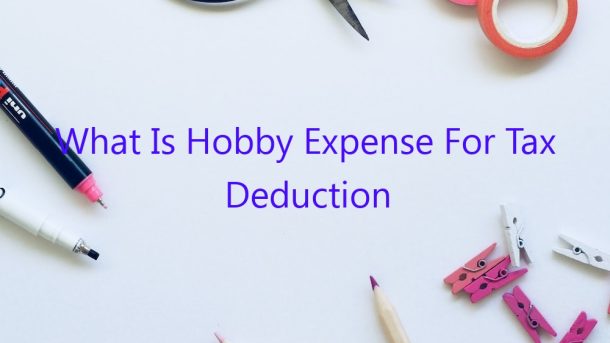A hobby expense is an expense that is related to a hobby. There are many expenses that can be considered a hobby expense, including, but not limited to, the cost of materials used in the hobby, the cost of equipment used in the hobby, and the cost of membership dues for organizations related to the hobby.
The cost of materials used in the hobby is probably the most common type of hobby expense. This includes the cost of items such as paints, brushes, clay, yarn, fabric, and wood. It can also include the cost of items such as stamps, coins, and postcards that are collected as a hobby.
The cost of equipment used in the hobby is another common type of hobby expense. This includes the cost of items such as tools, sewing machines, and musical instruments.
The cost of membership dues for organizations related to the hobby is another common type of hobby expense. This includes the cost of membership dues for organizations such as the National Rifle Association or the American Kennel Club.
There are many other types of expenses that can be considered a hobby expense. This includes, but is not limited to, the cost of travel related to the hobby, the cost of books and magazines related to the hobby, and the cost of insurance related to the hobby.
There are a few things to keep in mind when claiming hobby expenses on your tax return. First, the expenses must be related to a hobby and not to a job or business. Second, the expenses must be considered ordinary and necessary expenses for the hobby. Third, the total amount of expenses that can be claimed for the year cannot exceed the amount of income that was generated from the hobby.
Hobby expenses can be a great way to reduce your taxable income. If you are able to claim hobby expenses on your tax return, be sure to keep track of all of your expenses throughout the year. This will make it easier to calculate the amount of expenses that can be claimed.
Contents
What is considered a hobby for tax purposes?
What is considered a hobby for tax purposes?
The Internal Revenue Service (IRS) considers a hobby to be an activity engaged in primarily for recreation and not for profit. As a result, any income generated from a hobby is considered taxable income. However, taxpayers can deduct certain expenses related to their hobby, such as the cost of supplies, equipment, and other associated expenses.
There are a few things taxpayers need to keep in mind when it comes to hobby expenses. First, the expenses must be ordinary and necessary expenses incurred in order to engage in the hobby. In other words, the taxpayer can’t just deduct any expense they want, but only those that are directly related to the hobby.
Second, the expenses must be reasonable in relation to the income generated from the hobby. In other words, the taxpayer can’t deduct more in expenses than they earn in income from the hobby.
Finally, the hobby income and expenses must be reported on Schedule A of the taxpayer’s federal income tax return.
There are a few exceptions to the general rules for hobby expenses. For example, the cost of travel related to a hobby is not considered a deductible expense. In addition, the cost of a home office or other space used exclusively for the hobby is not deductible.
Overall, the IRS is looking to ensure that taxpayers are not claiming hobby expenses as a way to reduce their taxable income. If it appears that a taxpayer is doing this, the IRS may disallow the deductions.
What hobby expenses can I deduct?
As a general rule, you can only deduct hobby expenses if you itemize your deductions on your federal income tax return. In order to qualify, the activity must be pursued for hobby purposes and not for profit.
Hobby expenses are generally deductible if they are related to the activity and you can demonstrate that the expenses are necessary for the activity. For example, the costs of materials, supplies, and equipment used in your hobby activity can be deducted. Likewise, you can deduct the costs of travel and transportation related to the hobby, as well as the costs of education and training related to the hobby.
If you are self-employed, you can also deduct the costs of operating your hobby business, such as the cost of materials, supplies, and equipment. In addition, you can deduct the costs of advertising and promotion related to the business, as well as the costs of accounting, legal, and other professional services.
However, you cannot deduct the costs of your personal expenses, such as the costs of food, lodging, and clothing. In addition, you cannot deduct the costs of investments, such as the purchase of stocks or bonds.
If you have any questions about whether or not you can deduct a particular expense related to your hobby, be sure to speak with a qualified tax professional.
Can you claim hobbies on taxes?
You may be surprised to learn that you can actually claim some of your hobbies on your taxes. This can be a great way to get a little extra money back from the government, and it can also help you to reduce your taxable income.
There are a few things to keep in mind when claiming your hobbies on your taxes. First of all, you need to be able to prove that you are actually engaged in the hobby for recreational purposes. This means that you cannot claim it as a business.
In addition, you can only claim expenses that are related to the hobby. This includes things like supplies, equipment, and even travel expenses. You cannot claim the cost of the hobby itself, however.
There are a few things to keep in mind when claiming your hobby expenses. First of all, you need to make sure that you are claiming the right type of expenses. You can only claim expenses that are related to the hobby, and you cannot claim the cost of the hobby itself.
In addition, you need to make sure that you are keeping track of your expenses. This includes keeping track of the amount that you spend on supplies, equipment, and travel. You will need to provide this information to the IRS when you file your taxes.
It is also a good idea to keep track of your income from the hobby. This will help you to make sure that you are not claiming too much in expenses.
claiming hobbies on taxes can be a great way to get a little extra money back from the government. It can also help you to reduce your taxable income. However, you need to make sure that you are following the rules, and that you are keeping track of your expenses.
How much do you have to make on a hobby to file taxes?
Making money from a hobby can seem like a dream come true, but it’s important to understand the tax consequences of doing so. The good news is that, in most cases, you don’t have to pay taxes on income from hobbies. The bad news is that there are a few exceptions.
The general rule is that you don’t have to pay taxes on income from hobbies, as long as the income is not significant. The IRS defines significant income as income that is more than $1,000 per year. If your hobby generates income that is less than $1,000 per year, you don’t have to report it on your tax return.
However, there are a few exceptions to this rule. If you are a professional artist, for example, you must report all of your income from art-related activities, regardless of how much it is. And, if you are self-employed, you must report all of your income from your business, including income from hobbies.
In general, you only have to pay taxes on income that is generated from activities that are considered a business. A hobby is generally considered to be an activity that is engaged in for recreational purposes, and is not considered to be a business.
There are a few things to keep in mind if you are considering making money from your hobby. First, you should keep track of all of your income and expenses related to the hobby. This will help you to determine if the income from the hobby is significant enough to warrant reporting on your tax return.
Second, you should make sure to properly document your income and expenses. This will help you to prove that the income from the hobby is not significant, and is therefore not taxable.
If you have any questions about how to report income from your hobby, you should consult with a tax professional.
Can you deduct hobby expenses in 2021?
In general, taxpayers can deduct hobby expenses if the activity is pursued for profit. However, there are some specific rules that apply to deductions for hobby expenses.
For starters, in order to claim a deduction for hobby expenses, you must itemize your deductions on your tax return. Additionally, your expenses must exceed 2% of your adjusted gross income (AGI). So, if your AGI is $50,000, your deduction for hobby expenses can only be $1,000 (2% of $50,000).
There are a few exceptions to the 2% rule. If you are in a trade or business where you regularly participate in the activity, your expenses may be deductible even if they don’t exceed 2% of your AGI. Additionally, if you have a net loss from your hobby, you can still deduct your expenses up to the amount of your income from the hobby.
There are a few other things to keep in mind when it comes to deducting hobby expenses. For example, you can only deduct expenses that are directly related to the hobby. So, if you buy a new tool to help you with your woodworking hobby, you can deduct the cost of the tool. However, if you buy a new tool to help you with your gardening hobby, you can’t deduct the cost of the tool.
In addition, you can only deduct expenses that are considered “ordinary and necessary” for the activity. So, for example, if you take a trip to Paris to study art, you can’t deduct the cost of the trip. However, if you take a trip to a local art museum, you can deduct the cost of the trip.
Finally, you should keep track of all of your hobby expenses throughout the year. This will make it easier to calculate the amount that you can deduct on your tax return.
What is the hobby loss rule?
The hobby loss rule is a tax law that allows taxpayers to deduct hobby expenses up to the amount of hobby income. The rule applies to taxpayers who itemize deductions on their tax returns.
Hobby expenses are those incurred in connection with a hobby or activity that is not a trade or business. Expenses that are not deductible include the costs of goods or services that are not for the production of income.
For example, a taxpayer who participates in a hobby of breeding dogs may deduct the costs of food, veterinary care, and other expenses related to the hobby. However, the costs of purchasing dogs to breed would not be deductible.
The hobby loss rule is based on the principle that taxpayers should not be able to deduct expenses for activities in which they do not have a profit motive. The rule prevents taxpayers from using their hobby expenses to offset other income, such as wages or investment income.
There are some exceptions to the hobby loss rule. A taxpayer can deduct expenses related to a hobby if the activity is engaged in for profit. In addition, a taxpayer can deduct expenses for a hobby if the losses from the hobby are due to circumstances beyond the taxpayer’s control.
The hobby loss rule can be complex, and taxpayers should seek the advice of a tax professional to determine if their expenses are deductible.
What is considered a hobby business?
A hobby business is a business that is conducted primarily for recreational purposes. In other words, a hobby business is a business that is pursued primarily for the enjoyment of the owner, rather than for the purpose of making a profit.
There are a number of factors that may contribute to the determination of whether a business is a hobby business. Some of these factors may include the amount of time the owner spends on the business, the amount of money the owner spends on the business, the amount of profit the business generates, and the owner’s intent with respect to the business.
If a business fails to meet one or more of the factors that are typically used to determine whether a business is a hobby business, it may be considered a for-profit business. This is not to say that a for-profit business is not a hobby business, but simply that a business that does not meet the factors typically used to determine whether a business is a hobby business is more likely to be considered a for-profit business.
There are a number of benefits that may be obtained by operating a hobby business. These benefits may include tax breaks, the ability to deduct expenses from income, and the ability to use the business as a vehicle for marketing and networking.
In order to take advantage of these benefits, it is important to understand the tax laws that apply to hobby businesses. The tax laws that apply to hobby businesses are complex, and it is important to consult with a tax professional in order to determine how these laws apply to your specific situation.
Ultimately, whether a business is considered a hobby business or a for-profit business is a determination that is made on a case-by-case basis. There is no single factor that will always be determinative, and the determination may be based on a variety of factors.




